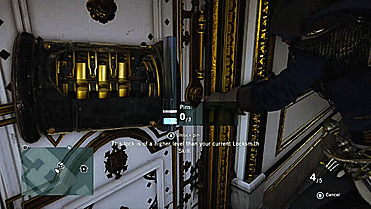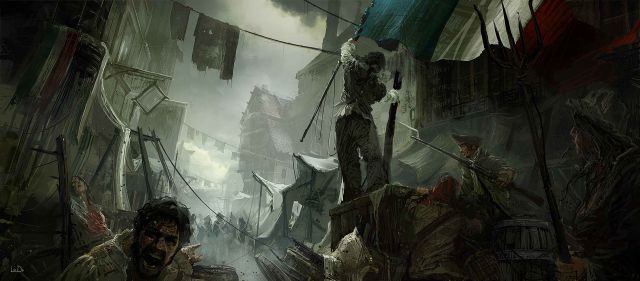It’s autumn, so that means it’s time for at least one new Assassin’s Creed game, keeping alive a now six year streak started by Assassin’s Creed II in 2009. We get two main-franchise entries this year: Assassin’s Creed Rogue (360/PS3) which continues (concludes?) the American Colonial era story and includes a link to Assassin’s Creed Unity (XBO/PS4/PC), which kicks off a new era/timeline in the French Revolution. That being said, there shouldn’t be many of you that aren’t familiar with the franchise’s formula, so we’ll breeze through what remains the same and focus more on how Unity sets itself apart, for better or for worse, from its predecessors.
The core format of the franchise remains intact: you are immersed in a specific time period, and you follow the era’s battle between Assassins and Templars through genetic memory in an effort to influence the same battle in the present era. Movement, for the most part, feels and functions in the same way (with a few notable exceptions that will be discussed later). On the one hand, if you’ve played an Assassin’s Creed game before, you’ll pick up the basic mechanics of Unity in no time. On the other hand, if you’ve played an Assassin’s Creed game before, you’ll be faced with some of the same mechanical flaws that have persisted since the franchise’s inception. The point of this paragraph is that Assassin’s Creed Unity is immediately recognizable as an Assassin’s Creed game.
 Unity does bring two or three great upgrades to the movement mechanics, though you still may find yourself running up random walls when trying to get through a small opening. First, Assassin’s Creed III introduced open windows and doors as quick automated shortcuts; Unity’s open windows and doors are fully navigable, and the interiors are explorable without loading times. Second, free-running has been given a new direction: down. Free-running up and across rooftops has always been one of the pure fun elements of the Assassin’s Creed franchise, but getting down has been something of a chore. Now, moving up, down, and around is more fluid than ever before. Finally, the free-running animations look and feel so much better. That may not sound like much, but it’s the little things that can make a difference, and those fluid free-running animations give the movement a more dynamic feel.
Unity does bring two or three great upgrades to the movement mechanics, though you still may find yourself running up random walls when trying to get through a small opening. First, Assassin’s Creed III introduced open windows and doors as quick automated shortcuts; Unity’s open windows and doors are fully navigable, and the interiors are explorable without loading times. Second, free-running has been given a new direction: down. Free-running up and across rooftops has always been one of the pure fun elements of the Assassin’s Creed franchise, but getting down has been something of a chore. Now, moving up, down, and around is more fluid than ever before. Finally, the free-running animations look and feel so much better. That may not sound like much, but it’s the little things that can make a difference, and those fluid free-running animations give the movement a more dynamic feel.
Speaking of the little things, the assassination animations are also improved, having the same effect as the improved free-running animations. Double assassinations, running assassinations, assassination from cover…they’re all just so very graceful.
On the other hand, you’re no longer able to simply hold the “Loot” button while walking through the strewn bodies of your defeated opponents. You have to re-press the button each time, which while not a big deal, gives looting more of a chore feeling. You also have to come to a nearly complete stop before being able to loot, interact with objects, or open chests. It is pretty jarring, and can be a liability if you need to move quickly.
The aforementioned battle between Assassins and Templars reaches into the present, and in the first few Assassin’s Creed games, that present battle was an important part of the story and gameplay. Since the end of Desmond’s story in Assassin’s Creed III, the presence of present day gameplay has all but disappeared. Unity still consists of a present day individual housed in an Animus, and some present day conversation occurs, but it is brief, and seems to exist only to provide context for why you’re playing as Arno Dorian. This isn’t intrisically good or bad, it just depends on your perspective. Desmond’s story was a strong complement to the stories of Altair, Ezio, and Connor, and I personally enjoyed the science fiction feel in contrast to the historical settings of his ancestors. I have heard others complain that the Desmond sequences were distracting and broke the flow of the historical era gameplay.
I enjoy the history of the French Revolution, and was excited to see that Assassin’s Creed was moving into it with Unity. The game, as with its predecessors, gives you some well known historical figures to interact with and ally with (Napoleon Bonaparte and Marquis de Sade, for example), but there doesn’t seem to be much point to Arno’s story. You see almost no context for why he is such a stalwart Assassin, the glitch sequences are jarring, and the nearly complete lack of present day involvement gives you no reason to care for the person in the Animus or why you’re playing through Arno’s story at all. That said, Arno’s story is still fun itself, and his main mission is deeply felt, though being a more integral part to this time in history would have been far more fascinating.
Speaking of gameplay, as I played Assassin’s Creed Unity, I found myself dying a lot more than I remembered dying in the previous entries to the long-running franchise. One of the best post-story activities in those previous entries was to pull aggro on a big group of guards or soldiers and just sit there taking them apart in a flurry of combos. I tried this approach early on in Unity, thinking I could throw finesse to the wind and simply brute force my way through objectives, and, well…it doesn’t work. I thought maybe I had just lost my touch, until a fellow reviewer confirmed having a similar experience.
Taking damage is more serious in Unity than in any of the previous games, including, perhaps, the first. Time heals all no wounds; you have a limited supply of medicine that has to be restocked through looting or shops. Parrying is mandatory for successful combat, especially when facing multiple opponents. Similar to the Arkham series, an incoming attack is indicated by a yellow mark on top of the attacker. When the attacker’s health bar flashes yellow, you parry and counter-attack. The major flaw in this is the camera, which has always been a bit of an odd spot for the franchise. The angle that the camera chooses to default to is terrible for combat with multiple opponents attacking from multiple directions. The yellow flash is often invisible, because it occurs outside of the frame, which contributes to a lot of one hit deaths.
It feels like Ubisoft wanted to make sure that players exercised more caution and utilized the various abilities, consumables, and strategies available; if that was the case, they succeeded, because you really need to take advantage of everything at your disposal. This becomes very obvious in the major sequence missions, where not only are you faced with often overwhelming odds, but you’re also provided with multiple mini-objectives that can help even the odds, such as lining up distractions and assistance.
Skills are now purchased using one of four currencies, rather than unlocked through gameplay, which strikes me as a little odd in certain cases. The ability to do a double assassination is one upgrade, while the ability to do double air assassinations is a separate upgrade. First, I would think that a double assassination would be a standard ability, given its prevalence in previous entries, rather than requiring purchase. Second, I would further think that a double air assassination would simply be a part of double assassination, since air assassination itself is not a purchased skill. The ability to use certain consumables, the ability to blend into the environment by sitting on a bench (oh, it gets sillier after the next comma), and the ability to use a ranged weapon at all are all skills that require specific purchase. Crafting is gone, so all ammunition must be purchased with another currency, along with weapons and equipment which, while purchased with the same currency as ammunition, are upgraded with one of two additional currencies. It could very easily have been simplified to two currencies: one for purchasing physical products, and one for upgrades and skills. That said, it doesn’t get in the way too often; it’s just silly.
 Also silly is the lockpicking system. Instead of something requiring finesse and control like Skyrim, Unity resorts to a simple “press the button when the sliding bar is inside the highlighted area” mechanism. This mechanism isn’t fantastic, with delayed response and a ridiculous initial level of difficulty. It is made easier with upgrades, which slow the speed of the sliding bar and increase the size of the highlighted area. Still, for a character archetype that relies on finesse and skill, a more intricate mechanism could have been designed.
Also silly is the lockpicking system. Instead of something requiring finesse and control like Skyrim, Unity resorts to a simple “press the button when the sliding bar is inside the highlighted area” mechanism. This mechanism isn’t fantastic, with delayed response and a ridiculous initial level of difficulty. It is made easier with upgrades, which slow the speed of the sliding bar and increase the size of the highlighted area. Still, for a character archetype that relies on finesse and skill, a more intricate mechanism could have been designed.
The variety of side missions and adventures in the game is a definite bonus. From the murder mystery detective missions that provide a fun change of pace to the crowd events that take place throughout the streets of Paris and make the city feel alive. There’s plenty to do on your own, but so much of the fun of Assassin’s Creed Unity comes in the cooperative play.
Unity’s cooperative play doesn’t stand apart as a multiplayer mode. It is built in to the very fabric of the game. Up to four players can run through Paris together, hosted in one player’s version of the city. Missions can be undertaken, street thugs can be cleaned up, or you can race your way through the streets and over the rooftops for the sheer fun of it. Co-op missions take on various forms, from assassinations to heists, and can be activated from anywhere in the city without requiring you to trek your way to its starting point. They can be started either as private or public missions, which will either restrict your team to just the people in the city with you, or will initiate public matchmaking for other assassins looking to take on the same mission. Running around the city on your own? Glitch-borne assassins will appear to offer you a chance to jump into an in-progress co-op mission.
Some of the most fun I’ve had with Unity so far has been simply running around Paris with a friend and collaborating on co-op missions, though it should be understood that communication with your fellow assassins in a co-op mission is vital to mission success. Play with friends, or be prepared for difficult missions.
Assassin’s Creed Unity is out today on Xbox One and Playstation 4, as a current-gen exclusive. It is accompanied by a built-in connection to the Assassin’s Creed Initiates system and a mobile companion app that helps you unlock in-game content. Though it has some shortcomings, they are relatively minor and unobtrusive, aside from load times so long that fast travel feels slower than just running across the entire damn city and an entire city of French people speaking with British accents. The sub-1080p resolution isn’t noticeable; Paris looks and feels great on a large scale, though it lacks some texture detail when you inspect it more closely. The framerate, especially for a game where fluidity of movement is essential, holds up well; there were only one or two moments in the game where I experienced any lag or choppiness, and though they were severe (with one instance hard crashing my Xbox), they were early on and not repeated. The improved free-running, lively streets, and unbelievably well done cooperative implementation are significant successes in bringing new life to the annual franchise.






